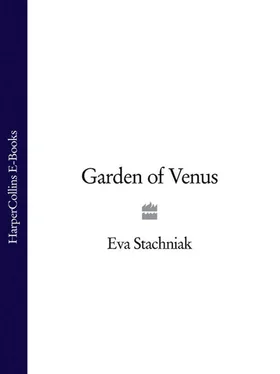Rosalia may have come to St Petersburg as the countess’s companion, but it wasn’t long before the timely administration of compresses and salves became more important than keeping up with the daily correspondence, greeting guests, or reading aloud after dinner. Which, as Aunt Antonia triumphantly pointed out in one of her many letters was not that hard to foresee.
Aunt Antonia, who liked to remind Rosalia that she was her only living relative and, therefore, entitled to such straightforward expressions of concern, might have forgiven Jakub Romanowicz for marrying a penniless Jewess only to die and leave his wife and child on her doorstep, but she could not forgive Maria Romanowicz for writing to Countess Potocka and begging her to take care of her only child. In Zierniki, the family estate near Poznań, a room was waiting for Rosalia. A room overlooking the orchard, with an iron bed the maids washed with scalding water each spring. A room where her mother’s old dresser still stood, its drawers smelling of dried rosemary and mint to keep the mice away.
There had been many times on this long journey when Rosalia pleaded with the countess to stop. The sick needed peace to regain strength and how was she to assure these precious moments of peace with all the packing, unpacking, and constant ordering of vats of boiling water (the grime of the inns had to be washed before the beds could be brought in). She too had her limits, and her nerves were strained to the utmost with this constant migration of coffers, crates, and trunks, the nicks and bruises of carelessness and neglect, futile searches for what should have been there and wasn’t. (The embroidered scarves and votive lights for the holy icon of St Nicholas had been left behind three times in a row and a servant on horseback had to be sent back to retrieve them.) Through August and September they had travelled for not more than a few hours daily, usually from four until ten in the morning, to avoid the heat, and then, perhaps, for two more hours in the afternoon. Often, in spite of the hot-water compresses Dr Horn had prescribed for the journey, the countess was in too much pain to travel at all.
It was already the beginning of October when they reached Berlin where Graf Alfred von Haefen put a stop to the nonsense of further travel. The Graf met the countess at the city gates and did not even try to hide his horror at the sight of her. ‘I forbid you to spend another hour in this,’ he said, pointing at the Potocki’s carriage. ‘My ears shall remain deaf to all objections. You’ll have to submit to a man’s judgement. This is the price of friendship.’ His Berlin palace would be at their disposal and so would be his own personal physician, Doctor Ignacy Bolecki. Bolecki, one of the best doctors in Berlin, was a Pole but had been trained in Paris. After assuring himself that the drivers understood his directions and would not attempt to take the wrong turn at the first junction—on moonlit nights oil lamps were put out to conserve fuel and that made the sign of Under the Golden Goose tavern where the right turn had to be taken barely visible —the Graf said to no one in particular that if an operation were truly necessary, a French surgeon would be sent for immediately.
By the time their carriage rolled into Graf von Haefen’s courtyard, the party was greatly reduced in numbers. Five servants with the kitchen carriage were sent back to the countess’s Ukrainian palace at Uman, leaving Rosalia with only two maids, Olena and Marusya, Agaphya, the cook, and Pietka, the groom. Mademoiselle Collard, the French lady’s maid had left in Poznań without as much as giving notice. ‘I have to look after myself,’ she said to Rosalia before leaving. ‘If I don’t, who else will?’ Always eager to question the refinement of Countess Potocka’s tastes, she did not fail to remind Rosalia that the white Utrecht velvet upholstery and green morocco-leather seats of the Potocki carriage had been chosen by Countess Josephine, the Count’s previous wife.
‘You are my prisoner, mon ange ,’ Graf von Haefen said, opening the carriage door to help the countess step out into the chair that was waiting already, kissing her hand twice and holding it to his heart, ‘and there is nothing you can do about it.’
To Rosalia’s relief, her mistress did not protest. By the time the countess was resting upstairs, awaiting the final arrangements of her sick room, their journey, she calculated, had lasted three months, three days, and five hours.
The heat has abated. It is September, the month of the smallpox. Her time now, Mana says. She is old enough and she will not be alone. Six of her cousins will have it too.
‘Help yourself so God can help you,’ Mana says.
In her hand Sophie is holding her mati, a blue stone, one of her birth presents. It has a black eye in its centre, and—like the red ribbon in Mana’s hair—it wards off the evil eye, human malice and the power of jealousy. Every time Maria Glavani hears that her daughter is growing up to be a beauty, she spits three times on the ground.
‘My precious Dou-Dou.’
Dou-Dou means a small parrot. A pleasing chirping bird everyone likes, everyone wants to touch and pet. Her true name is Sophie, or Sophitza. It means wisdom.
Mana cooks for three days so that there is enough food for the party: roasts slices of eggplant and marinates them in oil and lemon juice; cooks her best lamb ragout spiced with coriander. The meat will be tender enough to melt even in toothless mouths, and simmering for a long time, it absorbs the fragrance of spices. There is a big pot of soup with lentils and cardamom, pilaf sprinkled with cinnamon. And in the earthenware pot that is rarely used, chunks of feta cheese marinate in the best olive oil Mana can afford. Big jugs of country wine stand in the corner, by the window, like fat dwarfs. Strings of quinces and pomegranates, sage, mint, rosemary and savory hang from the beams. The water in the pitcher that greets the visitors at the front door has been drawn fresh from the well and is still cool. The hens are locked in the chicken coop and the goat is tied to the fence.
‘We are not beggars yet,’ Mana says. Maria Glavani’s daughter is not going to go wanting. There will be four kinds of sweet pastry, and baklava soaked with honey is already laid out on the plate with a yellow rooster in it.
Even the thought of such delicacies is a temptation. Dou-Dou has touched just the rim of the plate, but when she wants to lick the tips of her fingers, to savour even the smallest traces of sweetness, Mana stops her. ‘You are not an orphan,’ she says. ‘You have a mother who has taught you how to eat properly.’
The Glavani smallpox party will be remembered in Bursa for the food and the laughter. And for the singing too.
Rain, rain, dear Virgin,
Send snow and waters,
To moisten our vineyards
And our gardens….
The old woman who has the smallpox brings it in a nutshell. Her name is Agalia and she smells of soap and dried mint. Her own children have long left the house, but every one of her daughters sent for her when the grandchildren were old enough.
‘The best smallpox there is,’ Agalia assures the mothers and guests with a serious nod of her head and a smile of satisfaction. ‘Fresh as the morning bloom.’ There is a murmur of consent in the room, followed by sighs of relief. Maria Glavani has chosen well.
Dou-Dou giggles. Diamandi, most favourite of all her cousins, has poked her ribs, having pointed at Agalia’s grey hair. She’s so thin that her plait looks like a rat’s tail.
‘You are a happy one,’ Agalia says. ‘Good. Laughter is like sunshine. It makes everything grow. It makes people love you.’
Читать дальше












